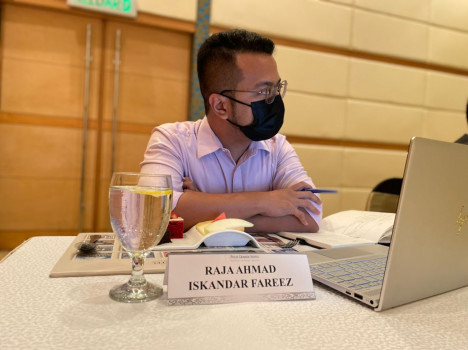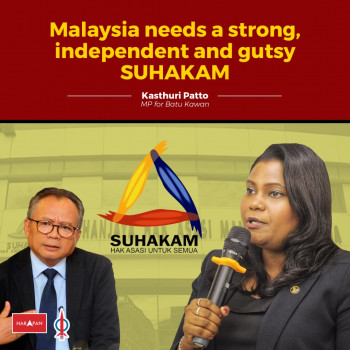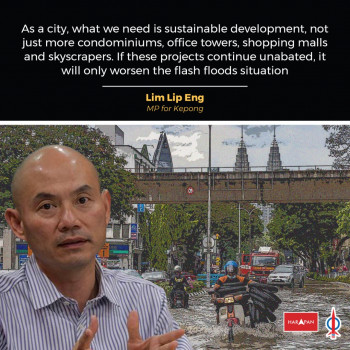By Wan Hamidi Hamid, Advisor of Impian Malaysia
 Politically, the year 2014 for Malaysia was almost similar to the previous post-2013 general election year. The Barisan Nasional government was still arrogant, believing that with its 48% popular votes it could do anything it deems good and right, whether or not the people want them.
Politically, the year 2014 for Malaysia was almost similar to the previous post-2013 general election year. The Barisan Nasional government was still arrogant, believing that with its 48% popular votes it could do anything it deems good and right, whether or not the people want them.
UMNO-BN
However, UMNO as the backbone of BN seems to be out of control. Despite Datuk Seri Najib Razak’s rhetoric about moderation and his rejection of extremism, those were mere words. Racist groups as well as religious bigots seem to be on the rise in Malaysia.
The Prime Minister and his administration have failed to stop the proliferation of racial supremacist groups who have become bolder in demanding extra “rights” of Malay and Muslims beyond the social contract, i.e. the Federal Constitution, while demanding the non-Malays to shut up or else.
Now that non-Muslims can’t use the word “Allah”, can’t have the Bible in Bahasa Kebangsaan (national language) and can’t celebrate Oktoberfest openly without being threatened by some guardians of the faith, Muslims too are being warned not to touch dogs, not to listen to scholars who preach moderate brand of Islam, to stay away from “liberalism”, “secularism”, “pluralism”, etc.
Based on the perverted logic of those supremacists, it means they want non-Malays to stay confined in their own world and not to mix with Malays, and vice versa; and that Malays – who are Muslims by definition of the Constitution – must not stray from the groups’ definition of Islam.
Any differing views are not tolerated, as in the case of an Indonesian “liberal” Muslim scholar who was banned from entering Malaysia to give a talk here and the arrest of 81-year-old Malaysian scholar Kassim Ahmad for criticising the orthodox ulamaks and their teachings.
On top of that, the UMNO-BN government is still stifling the voice of reason, freedom and democracy. The Malaysian government used the Sedition Act 1948, a British colonial law, against its own people. Among the recent victims were student Adam Adli, lecturer Dr Azmi Sharom, journalist Susan Loone, preacher Wan Ji Wan Hussin, politicians Teresa Kok and RSN Rayer, and perhaps as a token, racial supremacist group Isma leader Abdulah Zaik Abdul Rahman.
The word “token” is used here because many others were arrested for merely expressing their views. Whereas that token person and many others like him were threatening other Malaysians. Only he was charged yet the rest are still threatening other people who don’t agree with their views.
With such selective persecution and prosecution continue to happen here, what’s the difference between 2014 and the previous years?
Pakatan Rakyat
The 2014 story of our national opposition pact will always be remembered as the year of Parti Islam SeMalaysia becoming friendlier to UMNO. No, not all of their leaders. In fact many PAS leaders and members are very supportive within Pakatan Rakyat.
Only a certain group of people – those with real powers and influence – prefer to go back to trivial politics rather than a shared dream of building a freer, more democratic, fairer, more equal Malaysia.
The fiasco of the Selangor Menteri Besar issue – which ended up with Parti Keadilan Rakyat’s Azmin Ali becoming the state leader – has shown us the vulnerability of Pakatan as a solid coalition.
This time no one can really blame the mainstream media alone – controlled, cajoled and coerced by the UMNO-BN hegemony – because the drama was provided by the Pakatan political actors themselves, without much participation from the Democratic Action Party.
Yet as usual the DAP is always seen as the bogeyman, not just from UMNO propaganda machine but also from partners in Pakatan. Perhaps because DAP is outspoken, principled and secular – not to say the party is without fault in some issues – it’s easy to blame this social democratic party for allegedly questioning “Islam”, “Malay”, “Royalty”, with the usual race-baiting game.
From the time PAS top leader Datuk Abdul Hadi Awang failed to honour the plan for Pakatan’s Menteri Besar Selangor leadership, to his refusal to commit attendance for the Pakatan top leaders meetings, the future of Pakatan was, and still is, uncertain.
(Although the confusing political game of Datuk Seri Anwar Ibrahim vis a vis the Kajang Move and the conveniently-placed court decision on Anwar’s alleged sodomy case, did not help Pakatan much during the debacle.)
PAS is also in a strange position. Many of its central committee members are said to be solid with Pakatan yet Hadi the president and his ulamak group (religious scholar class) have begun to cast doubt about the coalition. Hadi’s attitude has upset many people especially the non-Muslim supporters of Pakatan, and for the sake of stating the obvious, this is not good at all for the opposition pact.
Yet ironically, with Azmin as the new Selangor Menteri Besar – although he was never the first choice – he may pave the way for a rejuvenated Pakatan. As long as he and PKR as well as the majority of PAS people share their trust with the DAP, without racial or religious prejudices, there might be a way to re-strengthen the pact’s political position.
After all, Pakatan won 52% of the popular vote. Only UMNO-controlled redelineation of electoral boundaries had saved the BN from losing power in the last general election.
The People
So what’s our hope for 2015?
For many of us, it’s all about earning more or spending less. It’s common sense. But earning more means working harder, and this means adjusting family life. Life’s going to be tougher than it is. But can we spend less?
With all the financial burdens including the coming enforcement of the GST, cutting of subsidies and therefore price increases of goods and services, can we expect anything political that’s capable of changing our fate?
At the risk of being simplistic, the short answer is no. Our fate can’t be changed by anyone because we the people – Malaysian voters – have to make the changes we want to, if we really want to, ourselves. In the last GE, 52% of us decided that enough was enough. Yet UMNO-BN still formed the government.
The only way to break from this manipulation of power is to give Pakatan more than 55% of votes in the next election.
We have to assume the extra 5% or more is needed to offset all the manipulations including redelineation, misuse and abuse of government machineries and apparatuses, biased media coverage, government’s refusal to educate voters, and vote buying and corruption.
Perhaps this is simplistic too. Yet it must be done if we really want a real change.
The first step is to change the government. Not because Pakatan is the best choice but because UMNO-BN has refused to change for the better. Its leaders are only interested in their capitalistic crony economy, racial politics and unfair social services.
With Pakatan in power after the next GE, the people – the voters – will finally feel empowered. Even with one person one vote, we’ll realise that we actually have power to change governments. That’s the meaning of “Ubah”.
Pakatan has promised, time and again, to implement economic and social programmes to benefit the people. Perhaps it won’t benefit all. No programmes in the world can benefit all. But surely it could be much better than BN’s crony capitalism. Penang and Selangor – under Pakatan governance – have shown the way despite having very limited Federal Government’s support.
The question is, the next general election is not due until 2017 or 2018, and so what can we expect of 2015?
For UMNO-BN, it’ll be the same, perhaps worse. The GST is expected to cause economic woes for all Malaysians except the crony capitalists and their friends and families. For the first time in history, every person in Malaysia will pay tax.
For Pakatan, the question is, will there be a Pakatan as we know it? Will PAS stay true to Pakatan? Or the political landscape will change very soon, with additional, if not new partners for Pakatan?
Or perhaps Pakatan may finally agree with DAP’s Impian Malaysia (Malaysian Dream) in putting together common ideas of all partners for a fairer and more equitable Malaysia, without resorting to race and religious trivialities? Perhaps some leaders may finally realise that racism and religious bigotry will only lead us into persecution, violence and destruction?
What about BN’s fixed deposits of Sabah and Sarawak? Will Putrajaya leaders and their Pakatan contenders look at East Malaysians as the poorer, easily manipulated cousins, or as equal partners who deserved equal respect?
These are some of the factors that can and will affect the political scenario of 2015, and these factors may determine the path for Pakatan in its attempt to wrest power from the clutches of UMNO-BN in the next general election.
*This views in the article are that of the authors and does not necessarily represent the views of The Rocket



